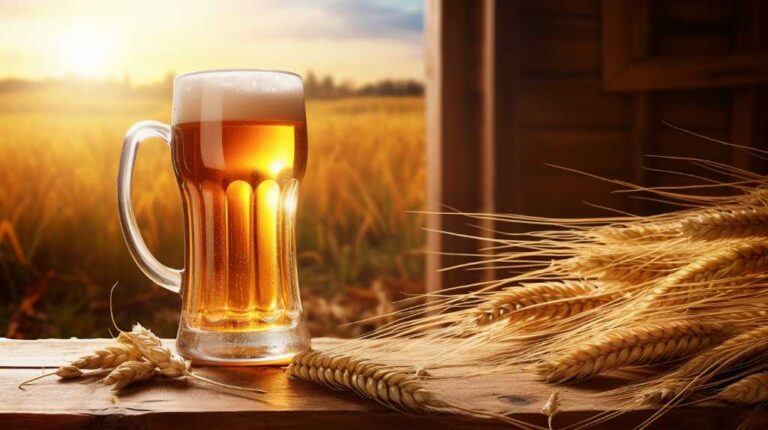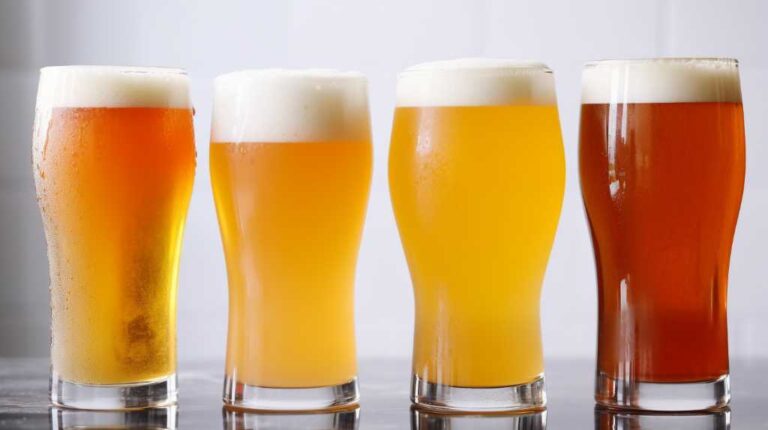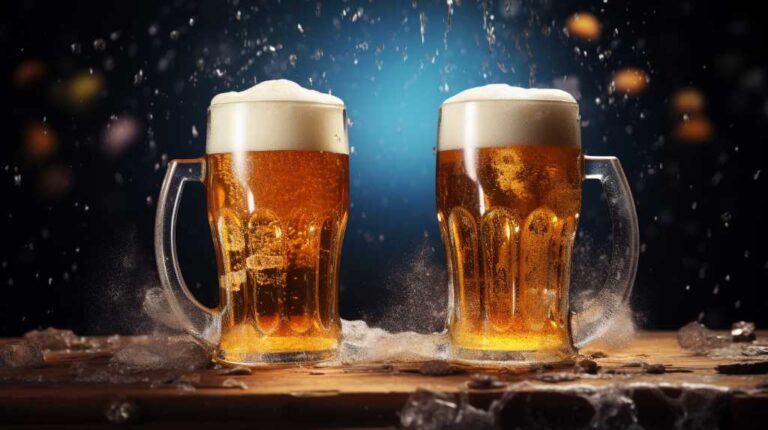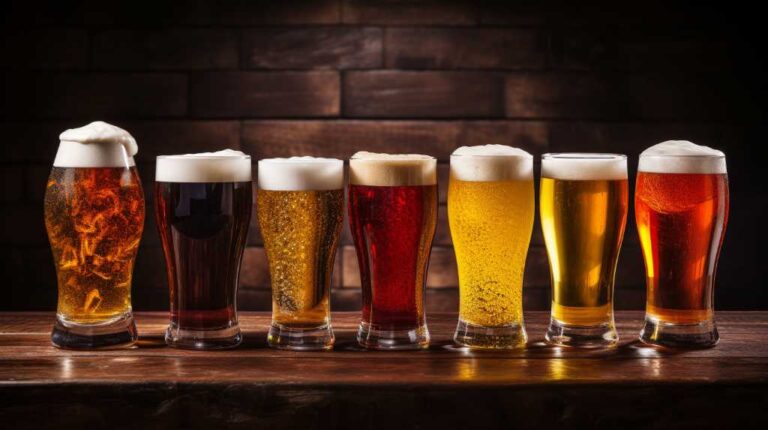Understanding the freezing temperature of beer is important for a better drinking experience, whether you’re a beer enthusiast or just enjoy a cold one.
Freezing Temperature of Beer

Did you know that the freezing temperature of beer can vary based on its alcohol content?
The alcohol by volume (ABV) of a beer has an interesting effect on its freezing point. Beers with lower ABV freeze faster than those with higher ABV. Lighter beers, typically with ABV ranging from 3-5%, can freeze in about 2-3 hours, while stronger beers with ABV above 8% may take over 6 hours to freeze.
The ABV directly influences the freezing time of beer. If you plan on chilling your beer in the freezer, it’s important to monitor the temperature and time carefully. Understanding the freezing temperature of beer is essential for proper handling and enjoyment, ensuring you can savor a perfectly chilled brew.
Effects on Aroma and Taste
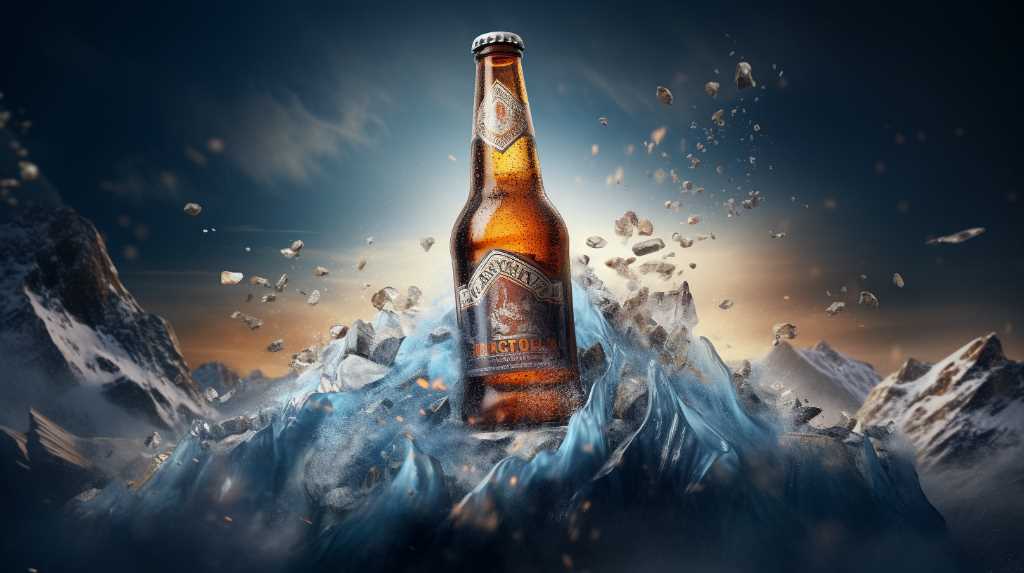
When beer is frozen, it can have a significant impact on its aroma and taste. Freezing beer can actually change the way it tastes and its level of carbonation, resulting in a different drinking experience.
One noticeable effect is on the carbonation, which can diminish or even disappear completely during the freezing process.
Additionally, the presence of sugar plays a crucial role in the freezing of beer. Sugar helps prevent the formation of icy fragments and keeps the water condensing, which lowers the freezing point of the beer. This is why frozen beer tastes different, as the sugar affects its overall composition.
It’s important to handle and store beer properly to maintain its quality and preserve its aroma and taste.
Risks and Recommendations
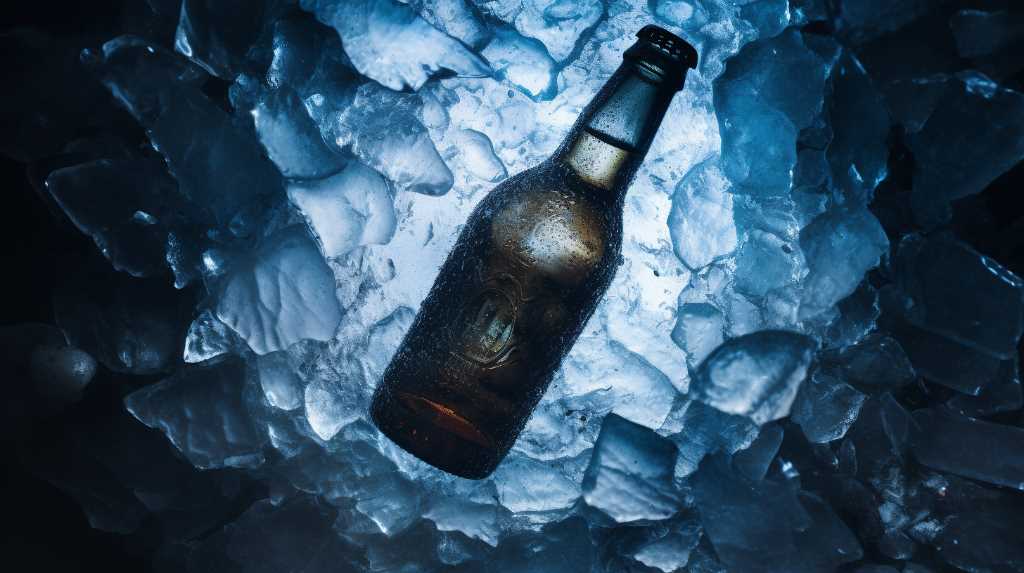
Risks and Recommendations
Freezing beer may seem like a convenient way to chill it quickly, but it comes with potential risks. Here are some important recommendations to keep in mind:
- Proper storage methods:
- Avoid storing beer in the freezer for extended periods as it can cause bottles to crack or even explode.
- Instead, store beer in a cool, dark place for optimal chilling.
- When handling frozen beer, exercise caution to prevent accidents.
- Avoiding beer spoilage:
- If a beer hasn’t exploded or cracked, it’s generally safe to drink after being frozen.
- However, it’s recommended to move the frozen beer to the refrigerator before consuming it.
- If the beer isn’t suitable for drinking, it can still be used in other recipes or for cleaning purposes.
Factors Affecting Freezing Rate
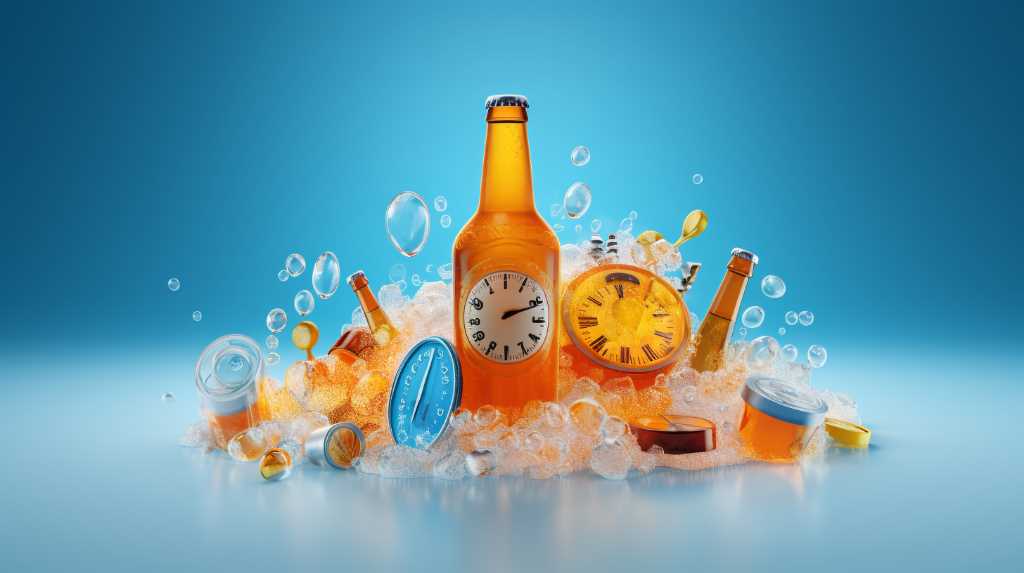
Factors Affecting the Freezing Rate of Beer
To understand why beer freezes at different rates, we need to consider its composition and the characteristics of the container it’s stored in.
Unlike vodka, beer isn’t pure ethanol; it’s primarily made up of water. Water freezes much faster than alcohol, so the components present in beer contribute to its freezing behavior.
One important factor is the presence of sugar in beer. Sugar acts as a preservative and prevents the formation of icy fragments. It keeps the water condensed, resulting in a lower freezing point for the beer. When beer freezes, the sugar content affects its composition, leading to a different taste.
Alcohol content also plays a significant role in the freezing rate of beer. The higher the alcohol level, the slower the beer freezes. However, since beer is predominantly composed of water, it may still develop icy flakes, even with higher alcohol content.
Additionally, the size and material of the container influence how quickly beer freezes. Different container sizes and materials can impact the freezing process of beer.
Understanding these factors is crucial for preserving the quality of beer and debunking common misconceptions about freezing beer.
‘Beer, like life, is best enjoyed at the right temperature.’
Alcohol Content and Freezing Point

The amount of alcohol in beer has a direct impact on its freezing point. Here are some important factors to consider:
- Alcohol concentration and freezing time:
- The higher the alcohol content in beer, the lower its freezing point.
- Beers with lower alcohol concentration freeze more quickly than stronger ones.
- Lighter beers, with lower ABV, can freeze in about 2-3 hours.
- Stronger beers may take over 6 hours to freeze.
- Impact of sugar on freezing temperature:
- Sugar acts as a preservative in beer, preventing the formation of ice crystals.
- The presence of sugar lowers the freezing point of the beer.
- The amount of sugar in beer affects its composition, resulting in a different taste when it freezes.
Understanding the relationship between alcohol concentration and freezing time, as well as the impact of sugar on freezing temperature, is important for properly chilling and enjoying your beer. So, next time you want to chill your beer, keep these factors in mind.
Impact of Container Size and Material
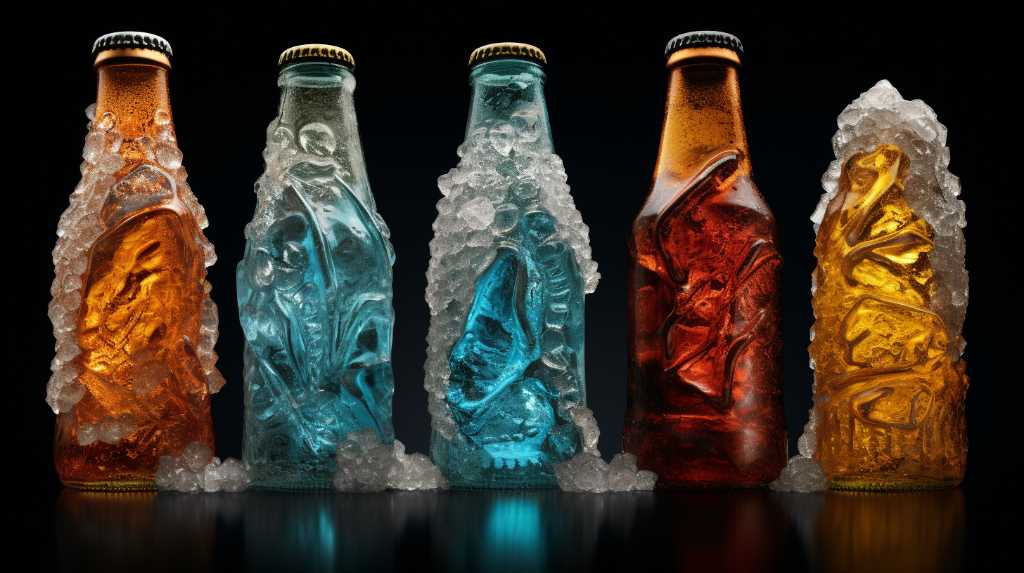
When considering the impact of container size and material on freezing beer, it’s important to understand how these factors can affect the temperature control and freezing rate of your brew.
The size of the container plays a role in how quickly beer freezes. Smaller containers offer better temperature control and freeze beer faster due to their reduced volume. On the other hand, larger containers take longer to freeze because of their increased volume.
Additionally, the material of the container can also influence the freezing rate. Containers made of materials with poor insulation, such as thin plastic or glass, may allow the beer to freeze more quickly. Conversely, containers made of materials with better insulation, like thick plastic or metal, can slow down the freezing process.
Therefore, container size and material are important considerations for achieving optimal temperature control and freezing rate when freezing beer.
Freezing Time of Different Beer Types
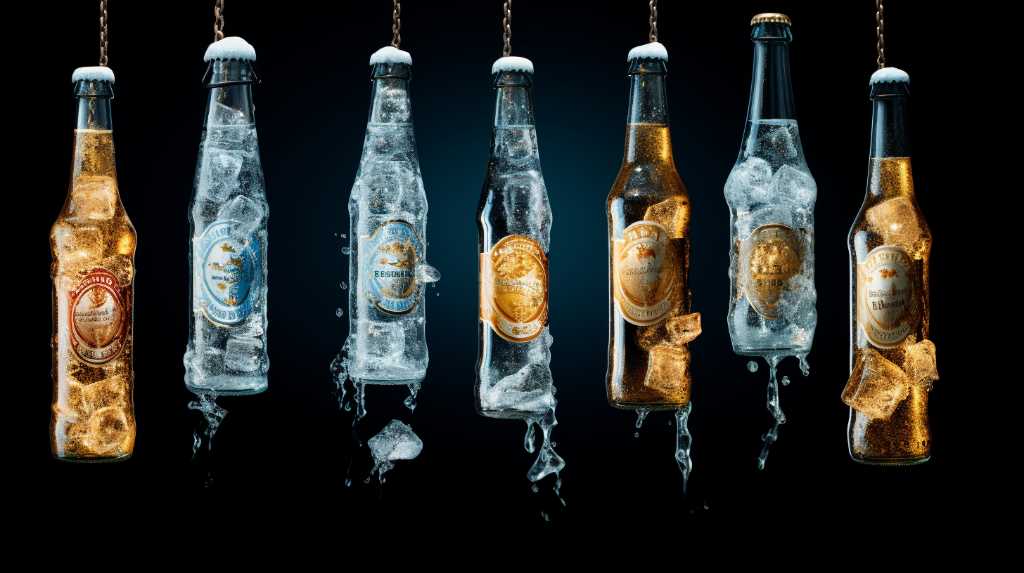
Different types of beers have varying freezing times based on their alcohol content and composition. Understanding the freezing times of different beer types is important for proper beer storage and preservation. Here are three key factors that determine how long it takes for different beer types to freeze:
- Alcohol by Volume (ABV) Content:
- Lighter beers with lower ABV freeze faster than stronger beers with higher ABV.
- Light beers typically freeze in about 2-3 hours, while stronger beers can take over 6 hours to freeze.
- Sugar Content:
- The presence of sugar in beer affects its freezing time.
- Sugar acts as a preservative and lowers the freezing point of beer, preventing the formation of icy flakes.
- Composition:
- The overall composition of the beer, including ingredients and additives, can impact its freezing time.
- Beers with higher water content freeze faster than those with higher alcohol content.
Proper Chilling Techniques
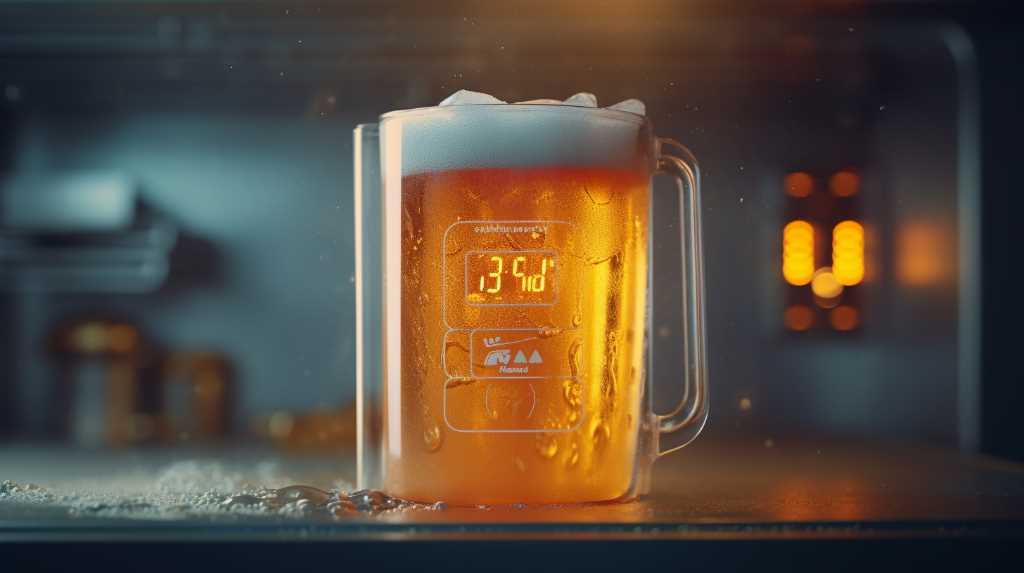
Proper Techniques for Chilling Beer
To chill your beer properly, the easiest and most effective method is to place it in the freezer for around an hour. This will quickly give you a cold beer to enjoy.
However, if you’re short on time or don’t have access to a freezer, there are other ways to chill your beer. One option is to wrap the beer bottle or can in a wet paper towel and put it in the fridge. The moisture on the towel helps cool the beer faster by promoting evaporation.
Another method is to put the beer in a bucket or sink filled with ice and water. The mixture of ice and water creates a cold environment that rapidly chills the beer.
Understanding the science behind beer freezing is important. Beer freezes because of its water content, although the alcohol in the beer lowers the freezing point. However, it doesn’t prevent freezing completely. Additionally, the presence of sugar affects the rate of freezing by preventing the formation of icy fragments.
Freezing beer can alter its taste and texture, so it’s best to properly chill it in the freezer for about an hour to enjoy a refreshing and cold brew.
Handling Frozen Beer
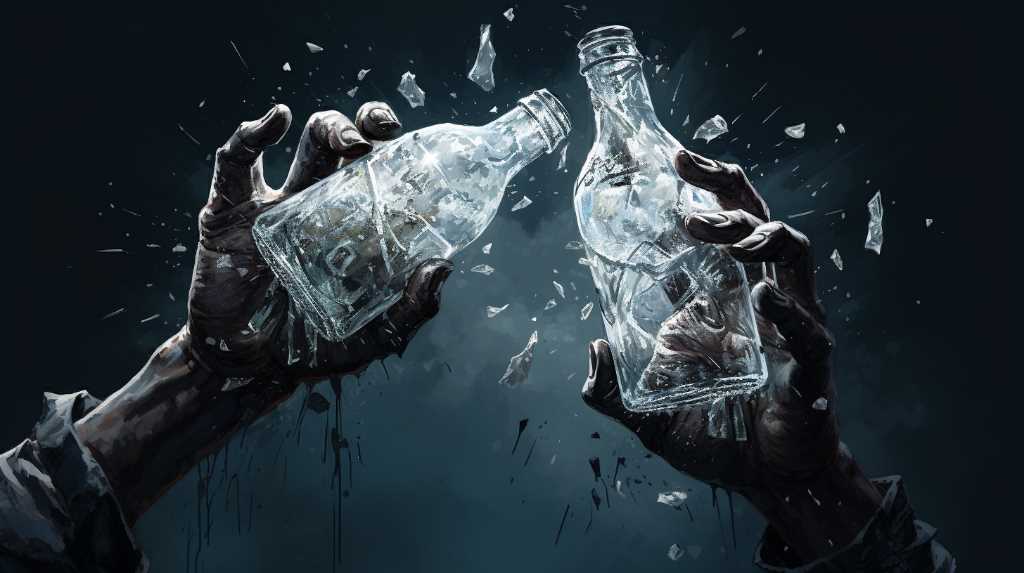
If you accidentally freeze your beer, the best way to handle it is by slowly thawing it in the refrigerator. Thawing beer too quickly can result in a loss of flavor and carbonation. Here’s a simple guide on how to safely thaw frozen beer:
- Place the frozen beer in the refrigerator: This allows for a gradual thawing process, preserving the beer’s taste and texture.
- Avoid rapid temperature changes: It’s important not to use hot water or a microwave to thaw the beer, as this can compromise its quality.
- Be patient: Thawing beer can take several hours or even overnight, depending on the size of the container and the alcohol content of the beer.
Understanding the science behind beer freezing can help you handle frozen beer properly and ensure a better drinking experience. Thawing beer slowly in the refrigerator allows it to return to its original state without compromising its taste and carbonation.
Can Freezing Beer Completely Ruin Its Flavor?
Does Freezing Beer Ruin Its Flavor?
Freezing beer can have an impact on its flavor, but it doesn’t completely ruin it. The effects of freezing on the carbonation and aroma of beer can vary. If you find yourself with frozen beer, it’s best to thaw it in the refrigerator before consuming. This will help preserve its taste and ensure a more enjoyable drinking experience.
How Long Does It Take for Different Types of Beer to Freeze?
Different types of beer freeze at varying rates. Lighter beers with lower alcohol content typically freeze in about 2-3 hours, while stronger beers may take over 6 hours. The freezing time is influenced by the alcohol content of the beer. This information is important for those who want to enjoy a cold beer but need to be mindful of the freezing time. It’s always good to plan ahead and give the beer enough time to chill without turning into a solid block of ice.
What Are the Proper Techniques for Chilling Beer?
If you want to chill your beer quickly without diluting it, there are a few techniques you can try. One option is to place the beer in the freezer for about an hour. This will help cool it down rapidly. Another method is to use a chilled beer koozie, which will help maintain the beer’s temperature. Additionally, you can wrap the bottle in a wet paper towel and place it in the fridge. The evaporation of the water on the towel will aid in cooling the beer. These techniques are simple yet effective ways to chill your beer without compromising its flavor.
Can Freezing Beer Cause Bottles to Crack or Explode?
Can freezing beer cause bottles to crack or explode? Freezing beer can indeed lead to bottles cracking or even exploding. This is because when liquid freezes, it expands, putting pressure on the bottle walls. As a result, the glass can’t withstand the increased pressure and may break. It’s important to note that freezing beer can also affect its carbonation and alter its aroma. Therefore, it is crucial to handle beer properly and move it to the refrigerator before consuming.
How Does the Alcohol Content of Beer Affect Its Freezing Point?
The alcohol content of beer plays a role in its taste and freezing point. When the alcohol levels are higher, the freezing process slows down. This can have an impact on the carbonation of the beer, potentially changing its flavor and texture. Understanding how alcohol affects the freezing point of beer is important for beer enthusiasts and those who want to ensure their beer stays at the right temperature. By knowing the science behind it, you can make informed choices about storing and enjoying your favorite brews.
